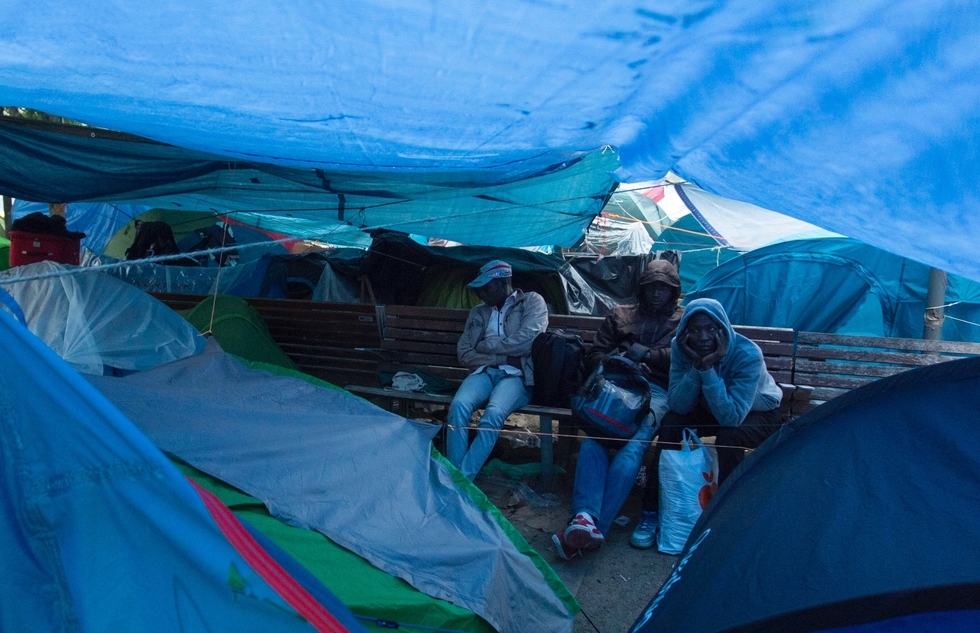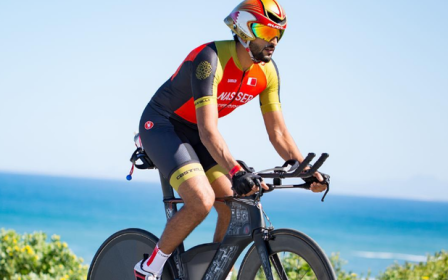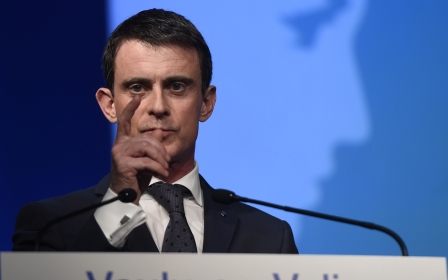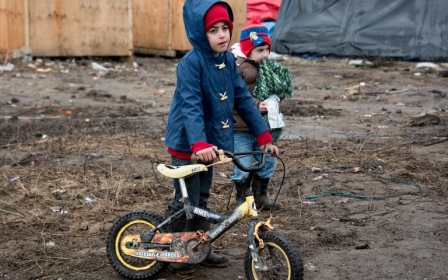'Where can I find peace?' Paris police clear refugee camp before Euro 2016

PARIS - Before authorities began evacuating a squalid makeshift camp in the early morning, lorries transporting beer in preparation for the 2016 UEFA European Championship roared down the street lined with tents and the sleeping bodies of almost 2,000 desperate people.
Homeless refugees and migrants from Afghanistan and Africa began living on the edges of Eole Park in north Paris a month ago.
In the past week, their numbers swelled to about 1,850 people, all hoping for an official evacuation that would see them housed by local authorities.
Amid the detritus and waste generated by hundreds crammed into a 4,000-square-metre area, many had lived in tents provided by local volunteers, and those without shelter passed nights on the pavement on cardboard boxes, pallets or in sleeping bags.
As the first police vans arrived on Monday, the camp’s occupants amassed their possessions. Some of the Afghans had suitcases, but many of the African migrants had only blankets or small rucksacks. One man clutched a pair of worn flip-flops and a carefully folded tracksuit to his chest.
“This is not what we expected from Europe,” said 24-year-old Fatima from Ethiopia, as she gathered clothes she had washed in a park fountain and spread to dry across the tents, packing them into a plastic bag in preparation for the evacuation. Every few minutes she doubled over with a hacking cough.
“It has been raining for a week and we couldn’t dry our blankets, so we have been sleeping in the wet and now I am sick. I hope we are going to a better place.”
The initially calm removal of the migrants by heavily equipped police deteriorated when evacuation buses arrived. Although refugees had been informed in French and English that there was enough space for everyone, Arabic and Pashto speakers were confused. The desperation of months of travel and weeks of living in the rain-soaked camp exploded, and hundreds of refugees surged forward against police defences.
After the women and families were driven off, police spent the next three hours holding back some 1,600 men, who made up most of the camp’s occupants, letting them through the shields one at a time to board the buses.
Spending on sport, not refugees
With the Euro 2016 tournament starting on Friday, the evacuation of the camp had been anticipated for days. Volunteers said such public manifestations of the capital’s failures to address the refugee crisis were not part of the impression France wished to give visiting football fans and tourists.
“People kept coming and 800 arrived in just four days because of the expected evacuation,” Parisian volunteer Renaud Martin told Middle East Eye on Sunday. He is one member of a group of local people who tirelessly collected and distributed donated tents, blankets, clothes and food to refugees.
“We have basically been doing the job of the government. France just spent millions on a tennis tournament [the French Open which finished last Sunday], yet it cannot find money to help refugees.”
The authorities admit they have been struggling to deal with the sheer numbers of refugees arriving in Paris from other countries, or returning from failed attempts to cross to England at Calais.
“The state has already provided 16,000 placements, but it is not enough because we are facing a phenomenon and it is difficult to deal with so many people,” the deputy head of the Paris Police Department overseeing the evacuation, Patrick Vieillescazes, said.
In the past year, 23 similar camps in Paris were evacuated and dismantled and refugees relocated to dedicated migrant housing or budget hotels, he said, adding that as soon as one camp closed, another would spring up elsewhere, particularly in the 18th Arrondissement.
Vieillescazes said some refugees were dissatisfied with the state-provided accommodations, so the authorities were seeing the same faces again and again at different camps, hoping to be housed in better or more central living quarters.
Tunisian migrant Ahmed, 36, said that Paris foyers - purpose-built refugee accommodations - were viewed as a business opportunity by some, who sublet their housing to other migrants. With few carrying identity documents, it is easy for them to use different names and even nationalities for purposes of registration and re-housing, he said.
Even Paris’s worst hotels are beginning to shun refugees, as volunteer Martin said that it was increasingly hard to find budget hotels willing to take refugee families.
“The Euro Cup will start in a few days, and hotels will be full. They are businesses and now they want tourists, not refugee families for whom the government only pays about $46 per night,” he said.
When NATO left
These hotels are also scorned by the refugees themselves.
“Our hotel is very old, in bad condition and is full of cockroaches,” said Afghani Nassir Essar, 37. “We had been there for 13 days but we have returned to the camp for the evacuation and are hoping for a better solution.”
Essar fled Afghanistan four months ago with his wife and three children after being threatened by the Taliban. Since they reasserted control in Afghanistan, he said, the Taliban has been hunting down and persecuting anyone, like himself, who worked with international armed forces and companies after the US invasion, making life impossible.
This was echoed by five former Afghan army soldiers also living in the camp. Crouched in a one-man tent shared with two others, Mohamed Ayoub proudly emptied out a folder showing his former life as a soldier in NATO forces: certificates of training, photos and ID documents.
“When NATO pulled out, I was left with no money, no job and no support, and now the Taliban want to kill me,” he said. “I escaped and came to find work, so I can bring my family here. I am very worried about them.”
In addition to Euro 2016, deteriorating health conditions and four confirmed cases of TB precipitated the closure of the Eole Park camp, according to Jasmine Leonardon, a volunteer with Les Medecins Migrateurs, a group of young volunteer doctors that regularly visits the camp.
“The conditions here are terrible; we have more suspected cases of TB and most people have scabies and other skin conditions,” she said. “We also see a lot of bone fractures because of fighting in the camp.”
In an environment where the distribution of food, clothing and bedding is the highlight of each day, fights were frequent.
“These people have nothing and can’t even wash themselves, so their power begins and ends with aid distribution. It is the only time they can be forceful or rebel, and they can become quite savage with each other,” volunteer Danica Jurisic said. “They are full of despair and frustration and sometimes this just explodes.”
For 30-year-old Sudanese refugee Mujahad Baharedeen, life at the camp has been far from what he expected Europe to be.
“There was fighting in Sudan, there was fighting in Libya, where I was for five months, and now there is fighting here - fighting for food, clothes, shoes, the toilet, a place to sleep,” he said.
"Where can I find freedom? Where can I find peace?” Dressed in his best clothes, he was full of anticipation and excitement about the opportunities the evacuation might bring, especially on the auspicious date of the first day of Ramadan.
But the reality for those housed by the Paris authorities has already fallen far below expectations.
On Monday evening, one man texted MEE a photo of an indoor basketball court filled with 300 camp beds. He said half the refugees took a look at the rows of beds, asked where the station was and left.
Middle East Eye propose une couverture et une analyse indépendantes et incomparables du Moyen-Orient, de l’Afrique du Nord et d’autres régions du monde. Pour en savoir plus sur la reprise de ce contenu et les frais qui s’appliquent, veuillez remplir ce formulaire [en anglais]. Pour en savoir plus sur MEE, cliquez ici [en anglais].




